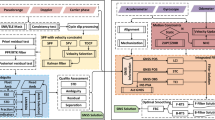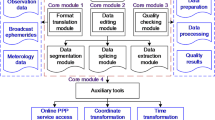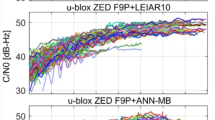Abstract
The accuracy of GPS positioning based on pseudorange measurements under signal degradation environments is limited by poor satellite geometry and signal distortions due to diffraction and multipath. As a result, the GPS position solutions could become unreliable. Those deteriorated solutions should be identified and not used for navigation. For that purpose, methods for reliable identification of deteriorated GPS positioning solutions from a navigation receiver should be developed. In this paper, a fuzzy inference system is proposed to classify the quality of GPS positioning solutions. The input for the system includes the signal quality evaluated by the difference between the measured and expected carrier-to-noise density ratio (C/N0) and the satellites geometry strength evaluated by the dilution of precision (DOP) number. The proposed fuzzy inference system is developed based on the human knowledge and understanding of the problem under consideration and is further optimized using data acquired from the field. The test results indicate that the proposed method can be used for reliable identification of deteriorated GPS position solutions affected by signal degradations.








Similar content being viewed by others
References
Brunner FK, Hartinger H, Troyer L (1999) GPS signal diffraction modelling: the stochastic SIGMA-Δ model. J Geodesy 73:259–267
Ghalehnoe A, Mohammadi K, Mosavi MR (2002) Improve determining the location of a moving body on map by low cost GPS receiver. In: 2002 student conference on research and development proceedings, Shah Alam, 16–17 July 2002
Hetet S (2000) Signal-to-noise ratio effects on the quality of GPS observations. In: GEOIDE Internal report, 30 August, p 30
Jang J-SR, Sun C-T, Mizutani E (1997) Neuro-fuzzy and soft computing. Prentice-Hall, Englewood Cliffs
Lin C-J, Chen Y-Y, Hang F-R (1996) Fuzzy processing on GPS data to improve the position accuracy. Soft computing in intelligent information systems and information processing. In: Proceedings of the 1996 Asian Fuzzy Systems symposium, Kenting, 11–14 December 1996
Mamdani EH, Assilian S (1975) An experiment in linguist synthesis with fuzzy logic controller. Int J Man-Mach Stud 7(1):1–13
Olynik MC (2002) Temporal characteristics of GPS error sources and their impact on relative positioning. MSc Thesis, Department of Geomatics Engineering, The University of Calgary
Parkinson BW, Spilker JJ (1996) Global positioning system: theory & applications. Progress in astronautics and aeronautics, vol 163. American Institute of Aeronautics and Astronautics, Washington
Seeber G (1993) Satellite geodesy: foundations, methods, and applications. Walter de Gruyter, Berlin
Wang J-H, Gao Y (2003) Evaluating the accuracy of GPS positions under severe signal-degradation using adaptive-network-based fuzzy inference systems (ANFIS). In: The 50th CASI annual general meeting and conference, Montrál, Quebec, 28–30 April 2003
Wells D (1987) Guide to GPS positioning. Canadian GPS Associates, Fredericton, Canada
Wieser A (2003) Fuzzy logic and GPS. GPS World, 1 March 2003. http://www.gpsworld.com/gpsworld/article/articleDetail.jsp?id=49880. Cited on 5 October 2004
Wieser A, Brunner FK (2000) An extended weight model for GPS phase observations. Earth Planets Space 52:777–782
Acknowledgements
The reviewers, Dr. Andreas Wieser in particular, are acknowledged for their critical comments on the manuscripts.
Author information
Authors and Affiliations
Corresponding author
Rights and permissions
About this article
Cite this article
Wang, JH., Gao, Y. Identification of GPS positioning solutions deteriorated by signal degradations using a fuzzy inference system. GPS Solutions 8, 245–250 (2004). https://doi.org/10.1007/s10291-004-0115-5
Received:
Accepted:
Published:
Issue Date:
DOI: https://doi.org/10.1007/s10291-004-0115-5




